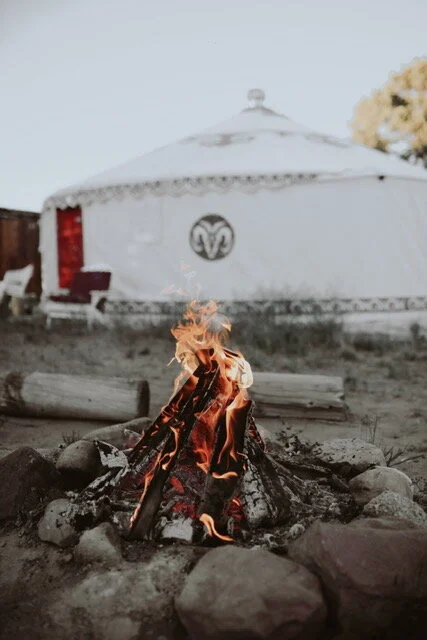Charcoal Fires at Sharp Turns in the Road

Charcoal Fires at Sharp Turns in the Road
By Peter Spaulding
“Things are not what they are, and they give more than they have.”
— paraphrase of Jacques Maritain
As I squat over my little tri-pod Weber grill, my young friend John over my left shoulder, I realize that we are roughly the same age as the two disciples whose names we share would have been the night of Peter’s betrayal, when he denied Christ to the servant girl at the door. What happened to the “disciple Jesus loved” when Peter went too close to the courtyard of the high priest, I wonder? He saw enough to record it in old age, that’s for sure. I imagine that the young John, no older than fourteen by some guesses, stood just beyond the farthest reach of the thin light given off by the fire, the first important charcoal fire of John’s gospel, and watched closely as his friend betrayed Christ.
But here, now, my younger friend has asked me to show him how to start a charcoal grill of this size, and I imagine he sees it as a kind of rite of passage into American manhood—and you can just hear countless full-bellied men descrying the over-cooking of all meats over the punchy strands of rising black smoke.
“You want to wait about thirty minutes, when the coals to start turning white, to put the meat on the grill.”
I’m not so sure when my defensiveness for my namesake started, but I must’ve been pretty young. Countless church-people have their take on the famously bad disciple, claiming patronizingly that they can “identify” with his failures. I warrant that he’s over-the-top, dramatic to a fault, such that he longs to die for the Christ and even declares that he will to all of his friends, some of which—like the little John—look up to him as the leader. But only the young John follows Peter all the way to the high priest’s courtyard, and only Peter gets so close to the God on trial. Small wonder that he returns to fishing for fish after news of his boldfaced hypocrisy spread among the others like a net cast into night’s black water that pulls up only weed and rock.
Today, on this warm day in my backyard, there is little betrayal and little hypocrisy in the cooking of this marinated chicken on the blackened grate, other than the fact that I am cooking a chicken I did not love enough to raise and slaughter with my own hands. John wants to know how long before you should flip it, and I’m scrambling for an answer that doesn’t involve “Google” as a transitive verb. I didn’t kill this chicken with my hands, and I didn’t raise it—I work on the faith in printed words on plastic wrapping that an authority had ethical considerations for the life of the beast that he or she didn’t understand. But here is a young man looking up at me.
“You can see the cooked part. You see it turning white? Once it gets halfway, you flip it.”
The young apostle John was the winner of a race to an empty grave of God; he was also in the boat, also on the strand, before the second important charcoal fire under which cooked freshly caught fish. But I see also an old John, alone in exile on a mostly deserted island, possibly blind, reciting to a younger man the stories of his friends, all long-dead, and their encounter with God. He’d had one friend particularly, whom he looked up to, who died as he lived, rather dramatically, hundreds of miles away from the exiled apostle, the caretaker of theotokos, mother of God.
As I remove a dusty Weber lid to inspect semi-cooked chicken breasts, which I’m only just now realizing is probably a radically dissatisfying meat for a moment of such ascendency to manhood, the young John beside me is asking me why I write poems and “words on words” about the weird things I write about. I’ve been afraid of talking about “nostalgia” lately because I’ve seen so many videos online exposing something called “weaponized nostalgia” in cinema and lit., etc., and I’ve been having a hard time knowing how it’s different from just “regular nostalgia.” I’m afraid also of getting into something Coleridgean and magniloquent with this early teenager.
“I don’t really know. I suppose because I think it’s my best chance at getting famous.”
He laughs and shrinks back a bit from our charcoal fire, but the daylight has exposed him: he really likes me and probably thinks I’m something of a leader.
“It also just helps me to remember.”
The second charcoal fire is the last thing the apostle chose to remember in his non-synoptic gospel, and if you lean into it enough you can feel the nostalgia rise like warmth from a dying fire. An old, dying man recounts the story of his friends reconciling over a meal of un-manly meat. But the cost of their reconciliation is also a prophecy of their deaths: a story of age coming on like a heavy tide while the forceful hands of youth wrap you in clothes and take you places you do not want to go. All restoration is nostalgic and gathering around a fire to eat certainly doesn’t hurt the process.
But my wife, who is herself nearly a god-bearer, interrupts our talk, calling us all in to eat together.
Peter Spaulding